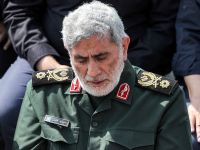Iraq prefers to repair a disused oil terminal on the Gulf rather than reopen a pipeline through Syria to boost its UN-controlled oil exports, Middle East Economic Survey (MEES) said Monday.
The Cyprus-based specialist newsletter said the Khor al-Amaya terminal was the favored option "because its recommissioning would be faster and cheaper than that of the Syrian pipeline".
Also, the terminal close to Iraq's southern oilfields was "well-placed to provide an additional outlet to serve the Asian and US markets, and Baghdad does not have to pay transit dues to a second country," it said.
But MEES said Iraq was still likely to push for reopening of the Syrian route, although it would add only a maximum of 300,000 barrels per day to export capacity as the pipeline is already being used by Syria for its own oil.
"In the case of Syria, there is a political agenda. The reopening of the pipeline ... would signal a thaw in relations between the two countries," it said, adding Iraqi authorities wanted "to open up as many export channels as possible".
On March 1, Iraq's oil ministry undersecretary said that the pipeline, including Iraq's part which has been disused since 1982, had been repaired on both sides of the border.
It could be operational "in the coming weeks, once the Syrian side has taken the decision to bring it back on stream", said Fayez Shahin.
Baghdad and Damascus signed an accord in August 1998 to repair the pipeline which links the Kirkuk fields in northern Iraq with the Syrian port of Banias on the Mediterranean.
Iraq, which aims to boost exports, currently uses the Gulf terminal of Mina al-Bakr, west of Khor al-Amaya, that is in need of repair and a pipeline running from the north through Turkey to the Mediterranean.
Its exports are supervised by the United Nations under an oil-for-food program, which allows Iraq, under sanctions since its 1990 invasion of Kuwait, to export crude in return for essential goods.
The UN Security Council has lifted a ceiling on the dollar value of Iraq's oil exports and doubled the amount of spare parts it can import for the sanctions-hit oil industry to 1.2 billion dollars a year.
Iraq plans to raise output from its current level of around 2.6 million barrels per day, of which nearly two million are exported – NICOSIA (AFP).
© 2000 Al Bawaba (www.albawaba.com)







